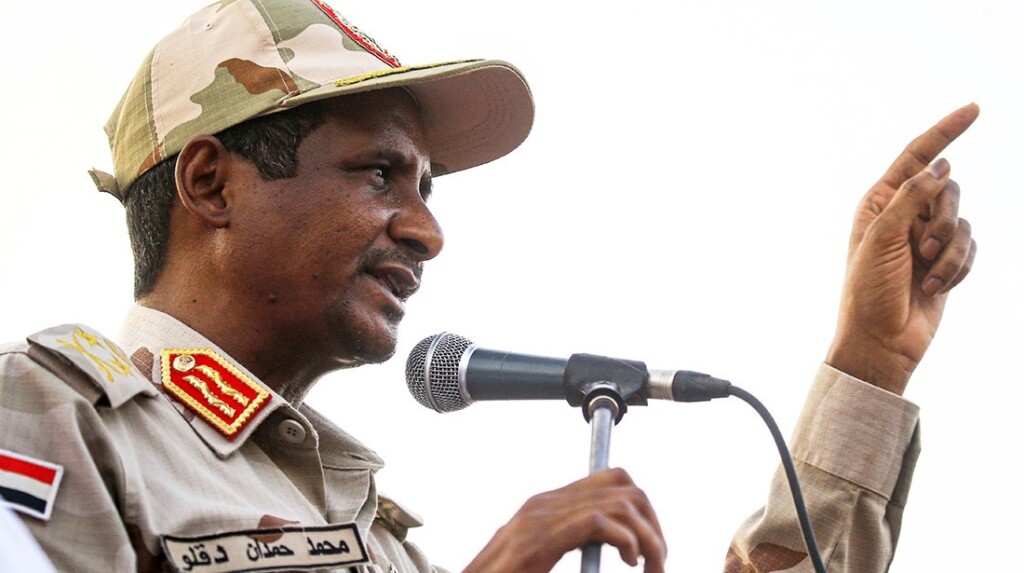Calls for targeted economic sanctions on Sudan’s warring generals

Lt Gen Mohamed 'Hemedti' Dagalo, Commander of the Rapid Support Forces (File photo: SUNA)
DABANGA SUDAN –
As the international community scrambles to limit the humanitarian disaster created by the fighting that erupted on April 15 between the Sudanese Armed Forces (SAF) and the paramilitary Rapid Support Forces (RSF) in Sudan, questions emerge on what can be done to end the violence and put the country back on a path to peaceful democratic transition.
Writing for Atlantic Council, Ernst Jan “EJ” Hogendoorn says that economic sanctions are an appropriate course of action to pressure the warring parties to cease fighting and hand over power to a civilian government.
“Now, it is not enough to simply call for a ceasefire and a return to negotiations because those outcomes could reestablish the fraught balance of power between the SAF and RSF,” the former senior advisor to the US special envoy to Sudan and South Sudan states. “Rather, international partners must increase financial pressure on the RSF, former Bashir-era government officials, and the SAF to change their political calculations at the negotiation table.
“Sudan cannot be stable if there are two armies and if former regime elites/Islamists are allowed to sow discord. International partners need to put coordinated financial pressure on RSF leaders to commit to integrating rapidly into the army and on former regime leaders to stop inciting violence; international partners should also put SAF generals on notice that they must honor their pledges to hand over power.”
The role of Al Bashir and his government should not be overlooked. Therefore, Hogendoorn urges “international partners [to] quickly freeze the assets of known Bashir-regime/Islamist leaders who are inciting violence in an effort to return to power”.
Political analyst Aly Verjee also calls for targeted sanctions in his blog ‘Thoughts on the Sudans’ – though he warns that “one should not conflate general, ill-framed sanctions with a strategic, targeted approach towards certain individuals, institutions, and corporations”.
In Sudan, sanctions bring about memories of hardship and suffering caused by the United States’ sanctions imposed between 1993 and 2017, Verjee says. Indiscriminate financial sanctions have proven to be ineffective instruments of policy, as ordinary Sudanese people were the most affected, not the targeted political-military elites.
Turning off the tap
To put pressure on Commander-in-Chief Abdelfattah El Burhan or RSF leader Mohamed ‘Hemedti’ Dagalo and their forces, Hogendoorn suggests that international and regional leaders work together to freeze the SAF and RSF’s bank accounts and temporarily halt their business activities.
This will limit their financial resources, making it difficult to pay their soldiers and allies, and force them to reconsider their stance on negotiations and compromise. The UAE and Saudi Arabia have a prominent role to play, as many Sudanese leaders base their finances in these two countries given past Western sanctions.
He argues that since “the RSF is unlikely to prevail against the SAF with its heavy weapons and support from Egypt, the least bad option to stop the fighting is to first apply pressure on Hemedti’s business empire, which funds the RSF – his soldiers are loyal because they are paid better, not for any ideological reason”.
External players, particularly the United Arab Emirates and Saudi Arabia, should freeze RSF and Hemedti-family bank accounts and business activities until RSF leaders agree to integrate their troops into the SAF without any delay. “Similarly, international partners must quickly freeze the assets of known Bashir-regime/Islamist leaders who are inciting violence in an effort to return to power.”
Likewise, identifying the assets and business interests of the SAF that are held abroad, and possibly freezing and seizing them, is crucial, should the army fail to honour its commitment to transfer power, or continues to prioritise the interests of the Khartoum elites over those living in the rest of the country. “Only in this way is a sustainable ceasefire and peace possible,” Hogendoorn concludes his argument.











 and then
and then